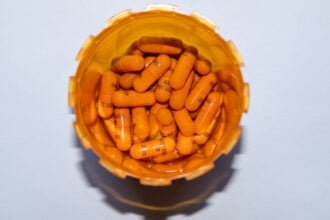Addictive substances, like prescription opioid medications, cocaine, marijuana, and alcohol, provide their “high” by the intense chemical interaction they induce with the human brain, the most complex organ in our bodies, and home to every thought, feeling, experience and memory we’ve ever known.
However, like any of life’s addictive things – substances, sex, gambling, and so on – the positive is always, always tempered by a degree of negative, and any euphoria that is experienced by the substance user will usually be paid for in other ways many times over.
“There are times when those eyes inside your brain stare back at you.”
– Charles Bukowski, “What Matters Most is How Well You Walk Through the Fire”
Our brains are amazingly complex systems of cells and chemicals, all with their very own set of intricate interactions, and research scientists, although far more knowledgeable about this most complex of organs, are admittedly still far from truly understanding “what makes us tick.”
In recent years, though, scientists have determined that the human brain will continue to grow, adapt and change throughout our lifespans, and, furthermore, it is capable of repairing itself even when damaged by the introduction of harmful and toxic chemicals, ie. through substance abuse and addiction, medically known as “substance use disorder” (SUD).
Substance Addiction: The Negative Effects on the Human Brain
A quick lesson in neurobiology: The human brain uses chemicals, called “neurotransmitters,” to send messages between cells, via specialized receptors which interpret the messages. Our brain contains around 100 different types of these neurotransmitters, all with their own specific function. This method of communication creates thoughts, actions, feelings, and so on.
In other words, it’s how and why we are able to live.
Adding other chemicals, both harmful and toxic, into the mix of this complex, yet natural, chemical-messaging system, and the results are all too predictable. One particular natural brain chemical is “dopamine” (often called the “happy chemical”). The brain’s timely release of dopamine is vital to the brain’s “reward system,” as well as our sleep cycles, learning, memory, attention, and mood.
When drugs or alcohol are introduced, the reward system overloads, and releases up to 10 times more dopamine than natural rewards provide, leaving the brain literally flooded with dopamine. As the brain tries to restore a natural balance, this high release of dopamine continues as the substance use continues.
The brain has no choice other than to become tolerant of the addictive substances being used, and once a chemical dependence has been established, higher quantities of dopamine are needed by the brain to avoid the dangerous symptoms of withdrawal. It is why the medical definition of addiction is “a chronic, relapsing brain disorder.”
Damage inflicted on the brain by substance abuse and addiction includes:
- Confusion
- Poor concentration
- Memory loss
- Lack of coordination
- Low sex drive
- Fatigue and apathy
- Dizziness
- Mood disorders, like depression
- Decreased cognition
- Aggression, and
- Hallucinations
There are three distinct areas of the brain that will have borne most of this damage, and these are:
- Brain Stem: Responsible for physical functions, eg. controlling heart rate, breathing, and sleeping
- Cerebral Cortex: Responsible for problem-solving and decision-making; substance abuse can even cause structural changes in this area
- Limbic System: Responsible for emotion and memory
How You Can Actively Heal Your Brain During Recovery
There is no denying the damage that substance addiction can inflict upon the brain, and many of the examples listed above, eg. memory loss, mood disorders and fatigue, will even continue after the substance abuse has been ended by treatment that includes both a medical detox and a program of abstinence.
Whether you are being treated at a residential rehab, living in a recovery house in Arizona (which is where I spent many months at the beginning of my own recovery), or attending an outpatient program, you can be proactive in helping your brain to heal this damage, even including the structural changes in the cerebral cortex that may have occurred (although, this takes far more time).
Here are your recommendations, learned through either my own experience or through the professional advice of addiction experts and clinicians):
#1. Complete Detoxification: When you finally bring an end to your substance abuse, your brain undergoes rapid and negative changes, and you may experience withdrawal symptoms, eg. detoxing from severe alcohol abuse (or alcoholism) can be dangerous, and even fatal, if you detox without medical support. Regardless, as you continue through the detoxification process, withdrawal symptoms will lessen, and your abstinence will trigger a healthy and natural re-adjustment of your brain’s chemical balance.
#2. Healthy, Nutritious Food: Substance abuse, if severe or regularly heavy in nature, will kill off cells in your brain. Therefore, you need to regenerate and protect existing cells, and to stimulate the growth of new cells in the brain. You can achieve this by choosing to eat a healthy, balanced and nutritious diet
Foods that are rich in omega-3 fatty acids, eg. fish, nuts and seeds, plant oils, and fortified foods, will quickly achieve both cell protection and cell regeneration. Your brain will begin to return to its pre-abuse level of health. Furthermore, brain cell regeneration can be enhanced by consuming flavonoids, resveratrol, and cumin, which can be found in foods like blueberries, cocoa, red wine, and curry.
#3. Regularly Exercise: Exercising daily or regularly will help to rejuvenate your brain, as it encourages new brain cell growth, and improves certain functions that will have been affected by substance abuse, eg. memory, focus, and cognition. Examples of exercise that will benefit you the most include running or jogging, swimming, yoga, and cycling.
#4. Cognitive Behavioral Therapy (CBT): CBT is aspecific type of behavioral therapy that teaches you to identify and change destructive thought patterns that have a negative effect on your behavior. Additionally, clinical research studies have shown that CBT can also help change dysfunctional behavior in your central nervous system, too. It does this by encouraging new neural network growth in your brain, which are exceptionally important for our mood.
Furthermore, CBT increases brain activity in two other areas of the brain – namely, the amygdala and the prefrontal cortex. The amygdala region controls how you process fear and threats, and the prefrontal cortex controls rational thinking. Therefore, CBT strengthens the control you have over your emotions and impulses.
#5. Stress Management (Mindfulness & Meditation): Protecting yourself from unwanted stress, a primary relapse trigger, is exceptionally important in addiction recovery. As stress can cause memory problems and inflammation, and can disrupt other critical brain functions, how you manage stress is critical to healing your brain. Activities that help to manage stress include learning mindfulness and meditation, participating in yoga classes, and learning relaxation techniques.
To summarize, here are the recommended ways you can use to actively help to heal your brain:
- Complete Detoxification
- Healthy, Nutritious Food
- Regularly Exercise
- Cognitive Behavioral Therapy (CBT), and
- Stress Management (Mindfulness & Meditation)
However, the most critically important way of proactively helping your brain to recover from any damage caused by substance abuse or addiction can be described in one simple word: abstinence.







